 In preparation for Euro 2008, several stadiums are being remodelled and rebuilt. Unfortunately, tickets in these modern but small venues already seem scarce. Graham Dunbar looks towards next summer
In preparation for Euro 2008, several stadiums are being remodelled and rebuilt. Unfortunately, tickets in these modern but small venues already seem scarce. Graham Dunbar looks towards next summer
Getting all passionate about sport – or just getting passionate at all – is quite an untypically Swiss thing to do. Congratulations then, Team Alinghi, on successfully defending the America’s Cup in July and reminding us that sport matters in an emotionally restrained nation that will co-host Euro 2008 with Austria. The Nautical Society of Geneva clubhouse – nominal home to Team Alinghi, despite the sailing taking place off Valencia – will never make anyone’s list of great sporting venues, but neither, too, will the Stade de Genève, one of four Swiss venues next summer.
It’s a 30,000-capacity ground with its own shopping centre and is wedged between a railway and an elevated dual carriageway, albeit with a stunning view south to the Salève mountain – television directors will love that shot. A fitting tribute to traditional Swiss neutrality is that the four-year-old stadium’s finest game was played between two foreign teams – England and Argentina, a Michael Owen-inspired 3-2 win in a November 2005 friendly. In fairness, the national team’s recent performance there in a 2-1 victory over Holland in late August deserved to be met with chants of “Hop Suisse!” ringing around the far-from-packed arena.
During the next nine months, the Stade de Genève will likely welcome a capacity crowd just once – and that for a gig by The Police. Until June 7, when the first of three group-stage matches is played there, 2,000 is usual for Servette’s home games in the second‑level Challenge League. Servette have been Swiss champions 17 times, but the club were demoted two divisions in 2005 after their parent company declared bankruptcy – apocalypse watchers noted the signing of Christian Karembeu a few months earlier – and left local taxpayers reluctantly footing the stadium bill. Today it is a major tournament venue stripped of almost all branding, though there are billboards for a brasserie “just ten minutes from the stadium”, and the Britannia Pub, a boozer opposite the central train station. Much will change next June. In will come the livery of UEFA’s corporate partners; out will go alcohol in the concourse bars, including the tray of six beers for 26CHF (£11) currently enjoyed by Servette die-hards.
Two other stadiums are familiar to Champions League devotees – FC Basel’s 42,000-capacity St Jakob-Park and, in Berne, boasting artificial turf and a solar-panelled roof, the 32,000-seat Stade de Suisse (better known as the Wankdorf). Fans in Zürich are also due for a culture shock soon, as the remodelled Letzigrund opens this month.
The decrepit but beloved old place closed after the 2005-06 season with FC Zürich unlikely last-day champions. Grumblings about ground-sharing with Grasshoppers were eventually forgotten as FC Zürich defended the title in style at their rival’s Hardturm stadium, an equally run-down affair that, in its dying days, offers the opportunity to pay cash on the gate and stand on a terrace with a pint and a sausage in hand while the gun-toting, beret‑wearing riot police lurk beside a pissoir worthy of Ayresome Park.
With a terrace culture that is defiantly British and disappearing in the big cities, a new magazine Zwölf is guiding the transition towards Swiss football’s biggest event since hosting the 1954 World Cup. The new Letzigrund, still with an athletics track, will comfortably host both Zürich clubs inside its 30,000-seat capacity, but the four Swiss venues, collectively, cannot begin to meet the demand for tickets.
The first ballot earlier this year was 30 times oversubscribed. Swiss far outnumbered Austrians, among applicants from just about every country in the FIFA rankings. The anecdotal evidence is that no one knows of a lucky lottery winner. However, fans have already been contacted by agencies offering ticket packages and, on the marché noir, 6,500CHF will reportedly get you four seats for the semi-final in Basel. Of the total 1,050,000 tickets available for the 31-match tournament, a further 399,000 will be distributed by the 16 competing national associations, leaving 300,000 for UEFA’s sponsors and guests. The official slogan of “L’emotion au rendez-vous”, or “Expect Emotion”, is surely prophetic. One way or another, frustration and anguish will visit England fans in the months ahead.
From WSC 248 October 2007